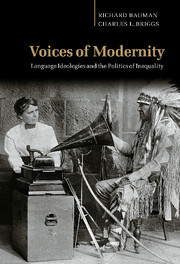Book contents
- Frontmatter
- Contents
- Preface
- 1 Introduction
- 2 Making language and making it safe for science and society: from Francis Bacon to John Locke
- 3 Creating modernity's others in seventeenth- and eighteenth-century England: antiquarian and philological inflections
- 4 The critical foundations of national epic and the rhetoric of authenticity: Hugh Blair and the Ossian controversy
- 5 Language, poetry, and Volk in eighteenth-century Germany: Johann Gottfried Herder's construction of tradition
- 6 Scientizing textual production in the service of the nation: the Brothers Grimm and Germanic philology
- 7 The making of an American textual tradition: Henry Rowe Schoolcraft's Indian researches
- 8 The foundation of all future researches: Franz Boas's cosmopolitan charter for anthropology
- 9 Conclusion
- References
- Index
8 - The foundation of all future researches: Franz Boas's cosmopolitan charter for anthropology
Published online by Cambridge University Press: 22 September 2009
- Frontmatter
- Contents
- Preface
- 1 Introduction
- 2 Making language and making it safe for science and society: from Francis Bacon to John Locke
- 3 Creating modernity's others in seventeenth- and eighteenth-century England: antiquarian and philological inflections
- 4 The critical foundations of national epic and the rhetoric of authenticity: Hugh Blair and the Ossian controversy
- 5 Language, poetry, and Volk in eighteenth-century Germany: Johann Gottfried Herder's construction of tradition
- 6 Scientizing textual production in the service of the nation: the Brothers Grimm and Germanic philology
- 7 The making of an American textual tradition: Henry Rowe Schoolcraft's Indian researches
- 8 The foundation of all future researches: Franz Boas's cosmopolitan charter for anthropology
- 9 Conclusion
- References
- Index
Summary
Social life in fin-de-siècle America placed many social scientists and social thinkers in an intellectual and political bind. They believed, on the one hand, in the power of modernity to produce a more enlightened and rational world, one in which freedom and democracy dominated. On the other hand, however, they were deeply concerned with the effects of modernity and industrial capitalism on contemporary society (see Ross 1991). Industrialization was often seen as having disrupted close-knit communities and pressed workers into impoverished urban quarters. The Jim Crow era was reversing the gains made by African Americans during Reconstruction. Crass exploitation of workers, especially immigrants and African Americans, elicited concerns that went beyond a politics of moral sentiment – it raised the specter of class warfare and socialist revolution. Some social scientists came to the conclusion that it was necessary to think beyond the nation-state and actually existing structures of inequality, and cosmopolitan imaginaries were woven into the theoretical foundations laid by a number of influential figures.
One of the most important of these was Franz Boas, a German immigrant of Jewish descent. George Stocking (1968: 149) points to the roots of Boas's liberalism in the lasting impact of the ideals of the Revolution of 1848 on many German intellectuals. Personal, scientific, and political goals merged in the form of a quest for truth that would ideally free humanity from the shackles of dogma.
- Type
- Chapter
- Information
- Voices of ModernityLanguage Ideologies and the Politics of Inequality, pp. 255 - 298Publisher: Cambridge University PressPrint publication year: 2003



